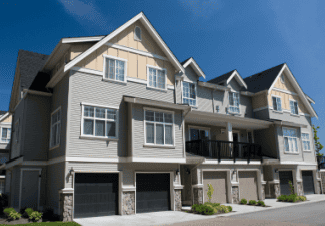Urban Apartments Are Struggling. Here’s Why They Will Avoid Distress

Then, COVID hit. With office workers free to work from wherever they wanted, many have decided to leave urban core apartments in places like New York and San Francisco for cheaper housing with more space. “The markets that are going to struggle are very tourist-driven or the urban cores, like downtown San Francisco and downtown Manhattan,” says Sam Isaacson, president of Walker & Dunlop Investment Partners. “It’s going to be soft.
Even after a vaccine, Isaacson isn’t convinced that things will go back to normal.
“This might just be the new normal,” he tells GlobeSt.com. “Urban class A is going to be impacted for sure.”
But vulture buyers may want to look at other places for opportunities. “It doesn’t look like it’s going to be so severely impacted that there’s going to be true distress in that sector,” Isaacson says.
Isaacson doesn’t see many apartment developers handing their keys back to the bank, which could happen in other sectors. Even if there isn’t real distress in the market, he thinks a lot of developers will want to get out of deals because “their equity is wiped out.”
“You’re sitting at 95% of the [capital] stack, and you’re just going to move on and build the next deal,” Isaacson says. “You’ll make it up on the next deal or 10 deals or whatever the case may be.”
Specific markets could be hit especially hard. Places like Orlando and Las Vegas, where tourism is a significant employment driver, have hemorrhaged service jobs. As a result, apartment revenues are severely challenged.
Like many in the apartment industry, Isaacson thinks the government needs to step in with another stimulus. He says there is less consumption and policymakers aren’t doing anything to change
“We’re not doing anything about consumption right now,” Isaacson says. “It’s going to be problematic the longer we go without some sort of stimulus that truly has longer-term impact and really gets people back to work.”
A stimulus could help the broader CRE landscape. “You have certain markets that are going to be impacted more than others and certain sectors within commercial real estate that are going to be severely impacted versus others,” Isaacson says. “It’s very different from the last recession.”
As other sectors face problems, people lose jobs, which also hurts apartments.
“In hospitality, the whole sector is severely hurt,” Isaacson says. “Industrial is doing really well on the one hand, but there may also be some softness there.”
Specifically, Isaacson thinks industrial properties with small business tenants could struggle if more of those organizations go out of business.
Industrial, of course, is currently regarded as the crown jewel of CRE. So if there are issues in that sector, there are potential problems everywhere.
“There really is an interesting dynamic going on across commercial real estate,” Isaacson says.
Source: globest.com















 Accessibility
Accessibility